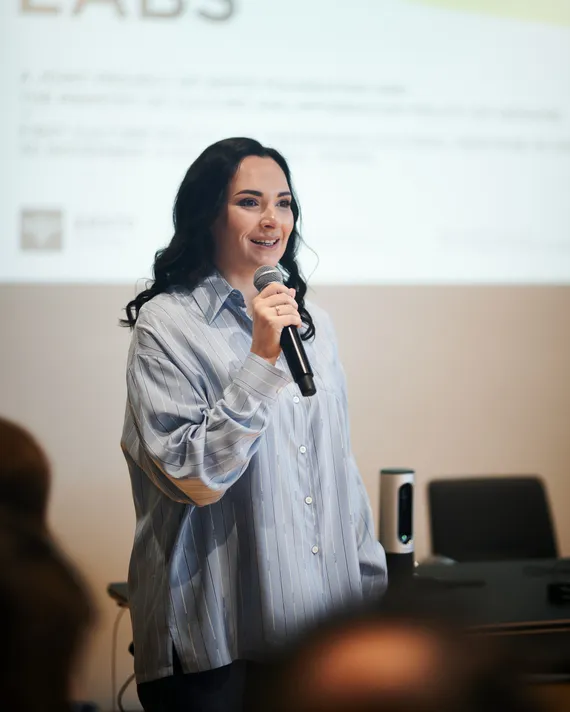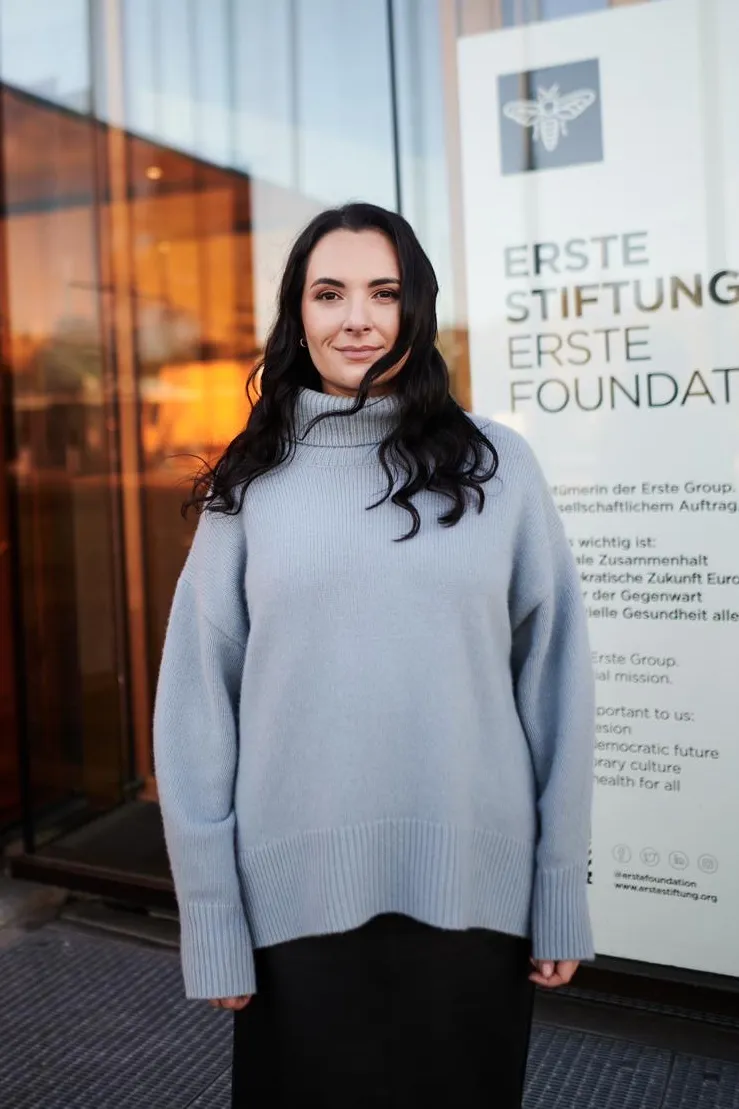
“You have to be brave to reinvent yourself.”
The #believeinyourself story from Yana Barinova
From managing Kyiv’s cultural affairs to rebuilding Ukraine’s future from Vienna, Yana Barinova has transformed her personal experience of being displaced into powerful action. Nearly three years after fleeing Russian missiles that would later destroy her Kyiv apartment, she now leads the initiatives focusing on Ukraine at ERSTE Foundation, working to preserve and strengthen her homeland’s democratic European future.

© Valeria Maltseva
Your life changed dramatically in early 2022. What has been your strongest #believeinyourself moment since then?
Those first months tested everything I knew about myself. I had just stepped into my dream role at Kyiv City State Administration and settled into a newly renovated apartment. When the war broke out, the choice became brutally clear: there was nowhere in Ukraine that was safe enough for my daughter. Leaving meant abandoning my home, my career – everything I had dreamed of in life. Looking back, it was the right decision – Russian missiles later turned my Kyiv apartment into nothing but a burnt hole in the building. Mariupol, my second home, was destroyed and it is occupied now – we lost everything, including family photos with a lot of memories.
Many displaced Ukrainians struggle to build new lives abroad. How did you manage this change?
I arrived in Vienna with advantages many others didn’t have: I was offered a job at ERSTE Foundation and had friends in Austria. But even with these privileges, reinventing yourself requires tremendous inner strength. It is always frightening to do something new, especially when it’s forced upon you. You have to be brave to say goodbye to your former self. I chose to embrace whatever lay ahead, allowing new experiences to reshape me rather than resisting them. I reinvented myself to make the most of the opportunities and contexts I am in now.
You live a normal life in Austria – going to work, meeting friends, enjoying the city – while still remaining deeply connected to Ukraine in wartime. How do you navigate between these two different realities?
It often feels like living two different lives. My work has become my way of coping – I’ve channelled everything into creating positive change for Ukraine. Now I believe I can make the greatest impact for my country’s future through my role at ERSTE Foundation.
Your personal experience also resulted in your helping Ukrainians in Austria, didn’t it?
Yes, through ERSTE Foundation we created the Professional Integration Hub Program, partnering with more than 24 leading Austrian institutions to provide three-month internships for displaced Ukrainian women professionals. Reading hundreds of applications was eye-opening – talented film directors, state managers, environmental experts, mostly women and all struggling to apply their skills here despite their impressive backgrounds. We’re helping them avoid having to downshift professionally, and instead find opportunities that match their capabilities. This is beneficial not only for the program participants, but also for Austrian institutions.

© Valeria Maltseva

© Valeria Maltseva
You live a normal life in Austria – going to work, meeting friends, enjoying the city – while still remaining deeply connected to Ukraine in wartime. How do you navigate between these two different realities?
It often feels like living two different lives. My work has become my way of coping – I’ve channelled everything into creating positive change for Ukraine. Now I believe I can make the greatest impact for my country’s future through my role at ERSTE Foundation.
Your personal experience also resulted in your helping Ukrainians in Austria, didn’t it?
Yes, through ERSTE Foundation we created the Professional Integration Hub Program, partnering with more than 24 leading Austrian institutions to provide three-month internships for displaced Ukrainian women professionals. Reading hundreds of applications was eye-opening – talented film directors, state managers, environmental experts, mostly women and all struggling to apply their skills here despite their impressive backgrounds. We’re helping them avoid having to downshift professionally, and instead find opportunities that match their capabilities. This is beneficial not only for the program participants, but also for Austrian institutions.
What does your work at ERSTE Foundation mean for Ukraine’s future?
I see myself as a bridge-builder to strengthen Ukraine’s path to Europe: by connecting stakeholders, facilitating dialogue, and transforming ideas into concrete projects. Over three years, we’ve built a robust support system for Ukraine’s future. Working directly with Ukrainian partners and grassroots organizations creates real impact. When I look at the people and projects we’ve supported, it feels almost magical. And unlike many initiatives, this isn’t just temporary – ERSTE Foundation is one of the few philanthropic organisations that supports Ukraine’s recovery systematically, long-term and with real commitment. Among our key long-term projects supporting Ukraine are Policy Labs, Kyiv Media School, Next Visionaries, Civil Society Leadership Programme for Ukraine, and the Mobile Education Project for Creative and Cultural Sector Professionals.
What drives you in this work?
I am a dreamer! With ERSTE Foundation’s support, I am helping other people to imagine Ukraine’s future too. Without dreams and a vision, Ukraine would lose the struggle. Russia’s goal isn’t just territorial – they want to annihilate our identity, erase our culture, and amputate our dreams of the future. ERSTE Foundation has become a platform where we can imagine and start building Ukraine’s future, even in these difficult times.
Why should Austrians and Europeans support Ukraine, and what mutual benefits do you see?
We're part of Europe’s future – a Ukraine that is democratic, prosperous and peaceful will make all of Europe stronger and more secure. You might not feel that so much in Austria, but it’s very clear in Slovakia, Czech Republic, Poland or the Baltic states.
Of course, it’s not only about Europe supporting Ukraine, but also what Ukraine brings to Europe. What’s unique about Ukraine is that we’re actively reimagining and rebuilding our institutions even in wartime. We’re fostering transformative partnerships across civil society, private and public sectors that will build the foundation for modern institutions in post-war Ukraine.
These collaborative models can for sure inspire innovation across Europe. Ukraine has also become a place where innovative practices are tested and developed in real-time. Whether it's digital governance, engagement in civil society, or rapid adaptation to challenges – Ukraine is serving as a pilot location for solutions that could be applied to address broader European issues.
Moreover, including Ukrainian voices and experiences in the European discourse brings fresh perspectives to policy-making. I am convinced, that our solutions, born of necessity and resilience, can contribute to addressing our shared European challenges.

